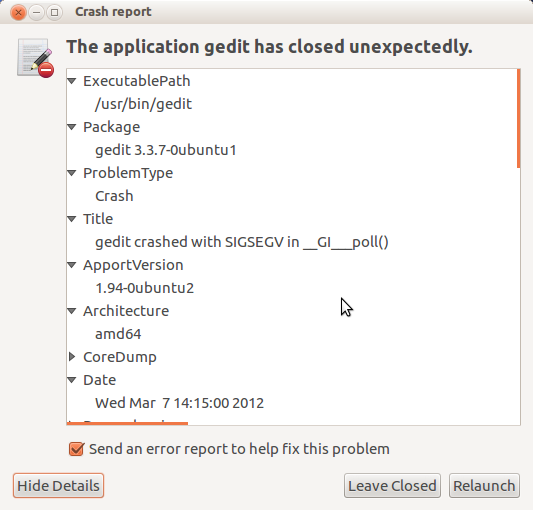What is this all about?
Debugging program crashes without any automated tools has been pretty time consuming and hard for both developers and users. Many program crashes remain unreported or unfixed because:
- Many crashes are not easily reproducible.
- End users do not know how to prepare a report that is really useful for developers, like building a package with debug symbols, operating gdb, etc.
- A considerable part of bug triage is spent with collecting relevant information about the crash itself, package versions, hardware architecture, operating system version, etc.
- There is no easy frontend which allow users to submit detailed problem reports.
- Existing solutions like bug-buddy or krash are specific to a particular desktop environment, are nontrivial to adapt to the needs of a distribution developer, do not work for crashes of background servers (like a database or an email server), and do not integrate well with existing debug packages that a distribution might provide.
Apport is a system which:
- intercepts crashes right when they happen the first time,
- gathers potentially useful information about the crash and the OS environment,
- can be automatically invoked for unhandled exceptions in other programming languages (e. g. in Ubuntu this is done for Python),
- can be automatically invoked for other problems that can be automatically detected (e. g. Ubuntu automatically detects and reports package installation/upgrade failures from update-manager),
- presents a UI that informs the user about the crash and instructs them on how to proceed,
- and is able to file non-crash bug reports about software, so that developers still get information about package versions, OS version etc.
We are sure that this will lead to a much better level of quality assurance in the future.
If you want to make crash reports of your software even more useful when being reported through apport, please see /DeveloperHowTo.
What does it look like for users?
The user side of apport is designed to be extremely simple and as unannoying as possible.
If any process in the system dies due to a signal that is commonly referred to as a ‘crash’ (segmentation violation, bus error, floating point exception, etc.), or e. g. a packaged Python application raises an uncaught exception, the apport backend is automatically invoked. It produces an initial crash report in a file in /var/crash/ (the file name is composed from the name of the crashed executable and the user id). If the crashed process belongs to the user who is currently logged in, or it belongs to a system process and the user is an administrator, apport informs the user about the crash and offers to report the problem:

You can click on “Show Details…” to see what data it collected:

If the user leaves the “Send error report” checkbox enabled, Apport uploads the collected information to the bug tracking system. After that it opens the packages’ bug filing page with a sensible default bug title and leaves the rest of bug filing process to the web UI.
Why is apport disabled by default?
Apport is not enabled by default in stable releases, even if it is installed. The automatic crash interception component of apport is disabled by default in stable releases for a number of reasons:
- Apport collects potentially sensitive data, such as core dumps, stack traces, and log files. They can contain passwords, credit card numbers, serial numbers, and other private material.This is mitigated by the fact that it presents you what will be sent to the bug tracker, and that all crash report bugs are private by default, limited to the Ubuntu bug triaging team. We can reasonably expect developers and technically savvy users, who run the development release, to be aware of this and judge whether it is appropriate to file a crash report. But we shouldn’t assume that every Ubuntu user of stable releases is able to do so. In 12.04 and up this is transparently handled by whoopsie, see ErrorTracker.
- During the development release we already collect thousands of crash reports, much more than we can ever fix. Continuing to collect those for stable releases is not really useful, since
- The most important crashes have already been discovered in the development release.
- The less important ones are not suitable for getting fixed in stable releases (see https://wiki.ubuntu.com/StableReleaseUpdates
- Asking users to send crash reports to us is insincere, since we can’t possibly answer and deal with all of them.
- Data collection from apport takes a nontrivial amount of CPU and I/O resources, which slow down the computer and don’t allow you to restart the crashed program for several seconds.
Note apport does not trap SIGABRT signals. If you are getting such a signal, then please see DebuggingProgramCrash.
How to enable apport
Apport itself is running at all times because it collects crash data for whoopsie (see ErrorTracker). However, the crash interception component is still disabled. To enable it permanently, do:
sudo nano /etc/apport/crashdb.conf
… and add a hash symbol # in the beginning of the following line:
'problem_types': ['Bug', 'Package'],
To disable crash reporting just remove the hash symbol.








